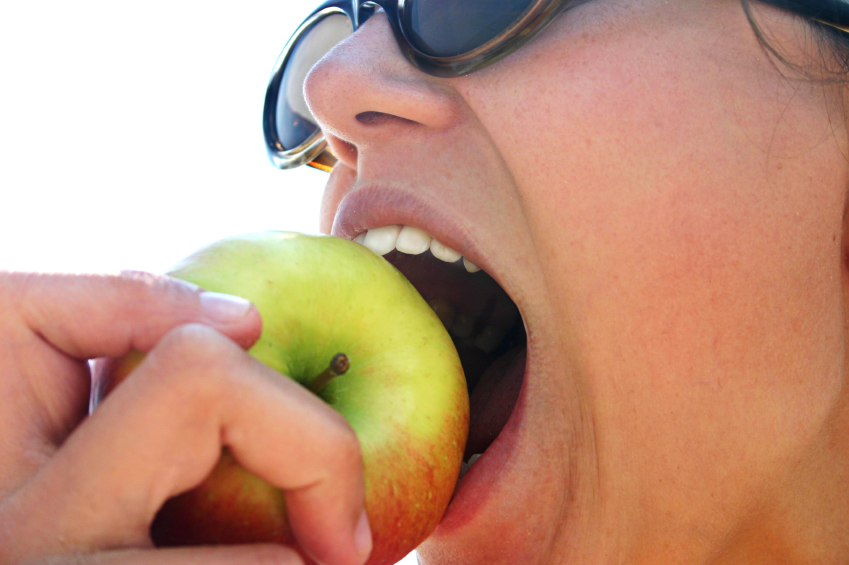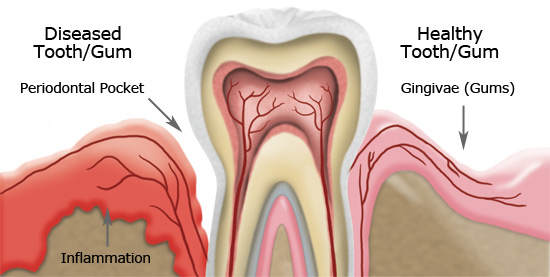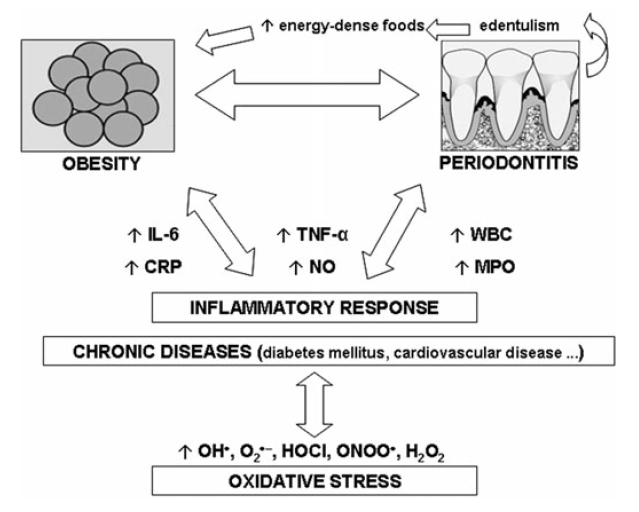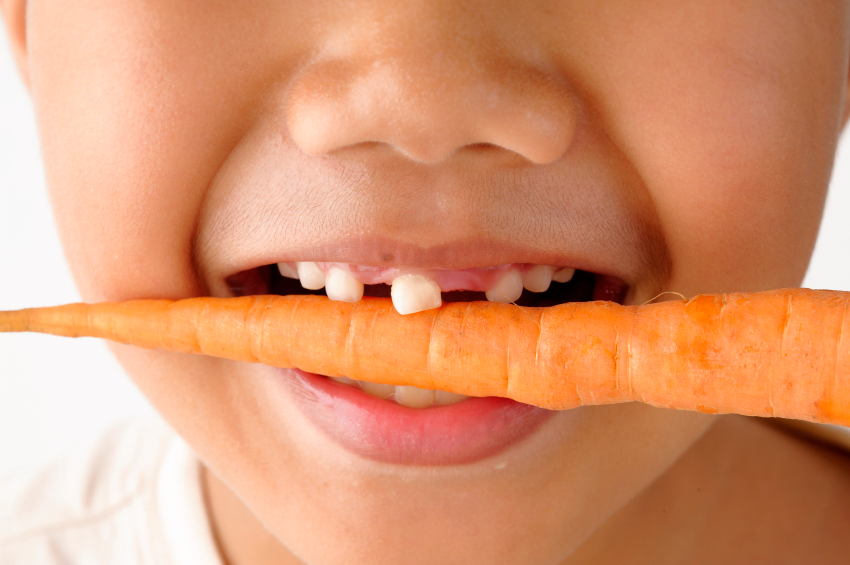Dental health is more important than most people realize. And nutrition plays a big role in this. Want to know what to eat to keep your teeth and gums strong? Chew on this.
Our teeth may be small. But they, and our gums, are a lot more important to our health than many of us realize.
Without teeth, we can’t chew. Imagine that. No more crunchy raw vegetables and fruits! No more nuts! No more peanut brittle! (Um… did I just say that?)
And here’s an interesting fact: People with 25 or more teeth tend to eat more nutritiously. (Apart from peanut brittle, that is.)
Not sure how many teeth you have? Go ahead, do a quick count.
We need healthy teeth and gums to eat nutritious foods. And we need to eat nutritious foods for healthy teeth.
As children, our diet influences how our teeth develop. And once we’re grown, with all teeth in place, what we eat plays a role in maintaining dental health.

Dental distress
If we don’t take care of our teeth and gums, we risk tooth decay, gum disease, and even bone loss.
Meanwhile, the state of our teeth and gums can often signal systemic problems, including cardiovascular disease, celiac disease, diabetes, sinus infection, rheumatoid arthritis, irritable bowel disease, gastroesophageal reflux, alcoholism, and more. In fact, your dentist can sometimes diagnose these conditions before your doctor!
If our eyes are a window to the soul, our teeth and gums are a window to our bodies.
Cavities
A cavity is a hole in the tooth’s enamel. Up to 90% of school children and the majority of adults have at least one cavity.
If you want inspiration to brush and floss, seek out some Google images of severe untreated cavities. Not a pretty sight.
Cavities result from the build-up of plaque – a sticky slimy substance composed mostly of bacteria. In breaking down sugar and carbohydrates, bacteria create acids, and these acids can eat away at the teeth.
Cavities hurt when they get bigger and touch nerves. An untreated cavity can become a tooth abscess.
So if you find a cavity, get treatment fast.
Periodontal disease
About half of American adults over the age of thirty have some form of periodontal, or gum disease.
Gingivitis, or inflammation of the gum tissue, is an early stage problem. With proper care, you can reverse it. But if you don’t, eventually the inflammation will lead to “pockets,” or little spaces between the teeth and gums.
Bacteria love to colonize these pockets, which can lead to periodontitis: the permanent destruction of the tissues that connect teeth to bone in the mouth. Not good.
Symptoms of periodontitis include swollen or discolored gums, tender gums, bleeding gums, receding gums, change in tooth sensation when eating, loose teeth, tooth loss, and bad breath.
And as if that weren’t bad enough, when gums are inflamed and broken, harmful bacteria can enter the bloodstream more easily, leading to other chronic health problems.
Periodontal disease is a risk factor for coronary artery disease. Why? We don’t really know for sure, but apparently gum disease doesn’t just signal inflammation; it also increases inflammation. And inflammation contributes to coronary artery disease.
Interestingly, the same bacteria that colonize our gums have also been found in arterial-wall plaque.
Periodontal disease can be treated with a procedure called root surface debridement. Root surface debridement, which is every bit as much fun as it sounds, involves tools that resemble torture implements, local anesthetic, hours wedged into a dental chair, and a huge bill.
Note: This procedure doesn’t guarantee a successful outcome.

Nutrient deficiencies & oral health
Mucosal cells in our mouths turn over within three to seven days. So nutrient shortfalls or excesses will show up in mouth tissue before they show up anywhere else.
Periodontal disease is associated with lower blood levels of vitamins and minerals. And getting enough of specific nutrients can be important to successful treatment.
What do you need for healthy teeth and gums, and why? Here’s a handy chart.
| Nutrient | What you need it for |
|---|---|
| Protein | Tooth structure, mucosal/connective tissue development, and immune function. |
| Calcium | Tooth structure; may enhance enamel remineralization. |
| Phosphorus | Tooth structure. |
| Zinc | Mucosal/connective tissues and immune function. |
| Antioxidants | Mucosal/connective tissues and immune function. |
| Folate | Mucosal/connective tissues and immune function; low levels are associated with periodontal disease. |
| Iron | Mucosal/connective tissues and immune function. |
| Vitamin A | Mucosal/connective tissues and immune function. But be aware that getting too much from supplements may result in gum problems. |
| Vitamin C | Collagen maturation and to maintain the integrity of the periodontal ligament; mucosal/connective tissues and immune function. |
| Omega-3 fats | Mucosal/connective tissues and immune function; modulates the inflammatory response. |
| Vitamin D | Mucosal/connective tissues, immune function; may enhance enamel remineralization. |
| B vitamins | Epithelial cell turnover. |
What to eat or avoid
A list of nutrients is all very well, but when you’re standing in the grocery aisle, you still need to know what actual food to buy.
Luckily, you don’t have to do anything special:<
Eat a mostly whole foods diet with lots of lean protein and fresh vegetables
Avoid most processed foods, especially those that are high in simple sugars.
Take your fish oil.
Want to go for bonus marks? Here are a few foods, nutrients, and/or supplements that may play a specific role in oral health.
Probiotics
Probiotics may help to decrease gingivitis and plaque; bacteria in fermented foods might suppress the growth of pathogens in the oral cavity. One study showed that consuming fermented dairy was associated with less periodontal diseases. Probiotics from any source could be helpful in a similar way.
Cranberries
Cranberries and other plant foods rich in anthocyanins (such as blueberries, red cabbage, eggplant peel, black rice, and raspberries) may prevent the attachment and colonization of pathogens on host tissues (including teeth).
Some studies even show that cranberry extract-infused mouthwash improves dental health! Sure, we all knew about blueberries’ superpowers, but who knew that the humble bog berry could give you healthy teeth?<
For more on phytochemicals like anthocyanins, see The Power of the Phytochemical.
Green tea
Polyphenols have been known to reduce bacteria and toxic products of bacteria in the mouth. Tea also tends to be rich in fluoride, possibly the most well-known tooth strengthener. For more on tea’s benefits, see What You Should Know About Tea.
Chewing gum with pycnogenol
Gum made with pine bark or sap has been shown to decrease plaque and bleeding gums. Great-Grandpa’s remedy really works!
Soy
A diet that includes soy may help to reduce periodontal disease.
Arginine
This important amino acid may alter oral pH and reduce chances of cavities.
CoQ10
Coenzyme Q10 is a substance similar to a vitamin. Our bodies need it to produce energy and it is found in every cell. Deficiencies may play a role in the development of periodontal disease.
Echinacea, garlic, ginger, and ginseng
Research shows that these plants help to inhibit growth of periodontal pathogens in test tubes. But human studies are still lacking, so we can’t draw firm conclusions about their benefits.
Whole foods first
Try to get the nutrients mentioned above from whole foods. (Bonus: You give your teeth and gums a workout!) Unless you have a known deficiency, supplements should not be necessary.
Keep in mind that if you’re a chronic dieter or you’ve had bariatric surgery, deficiencies are always more likely. Check with your doctor.
Fluoride
The mineral fluoride helps to prevent decalcification in our bodies. In other words, it helps us absorb and use calcium effectively.
It also acts topically on teeth to promote their surface health. Fluoride in saliva may help to promote remineralization of enamel.
In fact, getting enough fluoride is more important than reducing sugar when it comes to preventing cavities. (Don’t worry. I won’t tell your kids.)
Body fat & oral health
Adipose tissue
In obesity, excess adipose (fat) tissue often gets deposited in places where it shouldn’t be, such as the liver. Dental health is no exception.
Obesity is correlated with adipose tissue being deposited as a lipoma (essentially, a tumour-like mass made of fat) into in the oral cavity, such as inside the lips or cheek (buccal mucosa), on the tongue, or into the salivary glands (sialipoma).
Inflammation
It’s clear that controlling inflammation is important for oral health, and obesity is correlated with inflammation. This is why obesity is the second biggest risk factor for inflammation in the mouth. The only thing that’s worse for your oral health than being overfat is smoking.
Why? Because high blood sugar, AGEs, changes in salivary pH, and pro-inflammatory compounds all tend to be present in those who are over-fat. Meanwhile, mucosal cells may also be more permeable (due to nutrient deficiencies or imbalances).
The result? An increase in oxidants – those nasty free radicals that can damage our body’s cells.
Additionally, body fat cells release inflammatory compounds.
One common inflammatory marker associated with periodontal inflammation in folks with more body fat is orosomucoid. Meanwhile, orosomucoid is also a marker for malnutrition. Should that be a surprise? Maybe not, when you consider that many people become over-fat on a nutrient-poor diet.
People who are over-fat are also at greater risk for diabetes, and diabetes, in turn, is associated with poor oral health. This is probably due to elevated blood sugar and its associated effects.

Disordered eating & oral health
Healthy eating patterns can improve oral health, changing the pH of the mouth’s environment.
Meanwhile, the purging and malnutrition associated with disordered eating can seriously compromise oral health. Problems include enamel loss, lesions, dysfunctional salivation, swelling, and sensitivity.
For more on disordered eating, see All About Disordered Eating.
Aging & oral health
Our risk of periodontal disease goes up as we age. But the longer we maintain good oral health, the better our quality of life will be.
It’s not clear what exactly causes oral disease with age. Theories include wear and tear on teeth/gums, medication use, financial changes (leading to less preventive treatment), other chronic diseases associated with oral health, and/or immunological changes.
What is clear is that taking good care of our teeth and gums at every age is important.
Sugars & oral health
Eat more sugar, get more cavities, right? Wrong.
Are you surprised?
In fact, one study showed no relationship between eating highly sugared breakfast cereals and developing cavities!
Maybe the kids added a Listerine chaser.
But here’s a more probable explanation: It turns out that the sheer amount of sugar we eat may be less harmful to dental health than the frequency of consumption.
That’s why sugared sodas and energy drinks are so dangerous.
Sipping sugar-containing beverages provides repeated hits of sugar on the teeth. Most sugary beverages are highly acidic, which promotes demineralization. Our mouth gets a double-whammy.
Whether frequency or amount of sugar intake is key, one thing is for sure: A diet built around refined and processed carbohydrate foods can lead to tooth decay and gingival inflammation.
How much is too much – and what kind?
Added sugars appear worse for teeth than naturally occurring sugars.
The World Health Organization suggests that no more than 10% of total energy intake should come from added sugars. So, if you ate 2000 calories per day, that would be 200 calories of added sugars, or 50 grams.
(The WHO also suggests no more than four separate added-sugar foods each day. Based on these liberal recommendations, I have to wonder if the authors of the WHO report hold shares in Willy Wonka’s Chocolate Factory.)
Other sweeteners
Artificial sweeteners like sucralose (Splenda) and aspartame (Equal) don’t seem to promote periodontal disease or cavities.
Sugar alcohols, such as xylitol or erythritol, don’t seem to influence oral health. Actually, chewing gum containing the sugar alcohol xylitol after meals may even decrease your risk of forming cavities.
As for stevia, it doesn’t appear to have negative effects on oral health. But more research is needed here.
Recommendations
Get your oral hygiene on. Seriously. Are you flossing yet? Are you brushing at least twice per day? If not, start.
- Brush your teeth, not only with fluoride-based toothpaste, but also baking soda-based toothpaste. The baking soda will raise the pH in your mouth, making it more alkaline and therefore decreasing risk of cavities.
- Avoid smoking. Smoking can wreak havoc on gum and tooth health.
- Drink green tea. Drinking green tea improves the health of your teeth and gums, as it decreases inflammation, makes your mouth more alkaline, inhibits the growth of cavity-causing bacteria, prevents tooth loss, may slow progression of oral cancer, and freshens breath by killing odor-causing bacteria. Wow! All this, and it can help you to lose fat, too.
- Chew xylitol gum after meals. Xylitol increases saliva production and prevents the bacteria in your mouth from producing the acids that cause cavities. But don’t go overboard, because even if sugar alcohols won’t harm your teeth, they can cause gas and bloating.
- Eat mostly whole, nutrient-dense foods that provide plenty of calcium, phosphorus, magnesium, vitamin K (especially K2) and vitamin D. Foods like leafy green vegetables, nuts, seeds, hard aged cheeses, plain yogurt, meats, natto, beans, mushrooms, fish, eggs, and organ meats all work here. Oh, and make sure you get some sunlight.
- Eat some raw, crunchy fruits and vegetables every day. Raw veggies clean your teeth to a degree (apples, carrots, bell peppers, etc). Eating an apple as dessert after lunch will help to remove material that has adhered to the surface of your teeth. Plus, apples contain naturally occurring xylitol.
- Limit added sugars from both foods and beverages. This includes soda, fruit juice, energy drinks, candies, etc. Energy drinks are particularly damaging as they combine a high sugar load with an incredibly acidic pH. If your diet is built around energy bars and energy drinks, you probably won’t have any teeth remaining on your 45th birthday.
- Maintain a lean/healthy body composition. Excess body fat can promote poor systemic health, including poor oral health.
- Increase the amount of arginine in your diet. Eat more spinach, lentils, nuts, eggs, whole grains, meat, seafood, and soy.
- Get regular exercise. Exercise seems to protect against periodontal disease.
 Nature’s toothbrush.
Nature’s toothbrush.
Want help becoming the healthiest, fittest, strongest version of you?
Most people know that regular movement, eating well, sleep, and stress management are important for looking and feeling better. Yet they need help making it work in their busy, sometimes stressful lives.
That's exactly what PN Coaching does.
Over the past the past two decades, we’ve used the Precision Nutrition Coaching method to help over 150,000 clients lose fat, get stronger, and improve their physical and mental health… for the long-term… no matter what challenges they’re dealing with.
Our habit-based approach is backed by peer-reviewed research, trusted by professional athletes and elite sports teams, and has been taught to more than 175,000 health and fitness professionals worldwide through our Level 1 and Level 2 Certification programs.
References
Click here to view the information sources referenced in this article.
Share